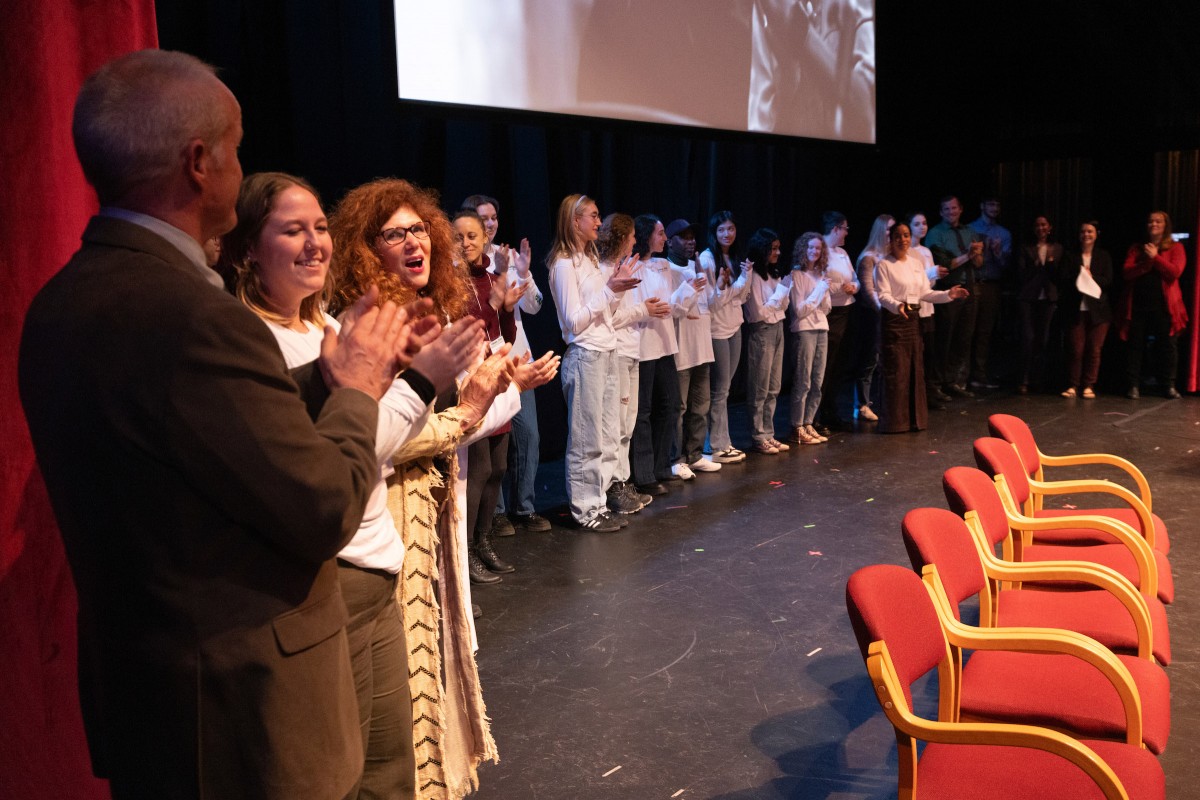Go green: Binghamton University launches the 1MReady campaign
Participants pledge to combat climate change in their everyday lives through the ‘carbon challenge’

Natalie Isaacs used to be one of the bad guys.
She spent 24 years as a cosmetics manufacturer in Australia, persuading consumers to pick up the latest in overpacked and highly disposable fast fashion. She measured her worth in the number of units that flew off store shelves and shrugged at the idea of climate change.
That all changed — courtesy of her household electric bill. Simple changes to her daily routine reduced her household energy consumption by 20%; that bill not only outlined her financial savings, but how much carbon dioxide emissions she had averted, potentially mitigating the effects of global warming.
“It was in that moment of looking at the bill that I realized I was powerful. I realized in that moment that what I do shapes the world,” said Isaacs, who went on to found 1 Million Women (1MWomen), an international organization that seeks to empower individuals to take action on climate change in their homes, workplaces and communities.
Now, Binghamton University students are signing onto the carbon challenge, thanks to the 1MReady_Bing campaign. Isaacs joined the University community for the national launch of 1MReady, which encourages individuals to take climate action. Open to everyone regardless of gender, the campaign is a cooperative effort between Binghamton University’s Kaschak Institute for Social Justice for Women and Girls, Binghamton Two Degrees, the Sustainable Communities Transdisciplinary Area of Excellence, the Office of Sustainability, the Center for Civic Engagement and the Binghamton University Common Read Experience, along with 1MWomen.
The statistics are dire, noted Kaschak Institute executive director Lorena Aguilar: 2023 was the hottest year on record since 1850, and 60 percent of mammals, birds, fish and reptiles disappeared between 1970 and 2014. Humanity has unleashed more than a trillion tons of carbon dioxide into the atmosphere since the start of the Industrial Revolution, and more people around the world are being exposed to flooding, drought and other climate events.
“The antidote to despair is meaningful action,” Aguilar said. “The campaign allows us to move from this feeling of helplessness to becoming an active player in combating climate change.”
Organizers hope that 2,000 University students will take the carbon challenge over the next six months. Leading the charge are the initiative’s climate ambassadors, who will spread the word about ways to reduce our carbon footprint on campus and beyond.
“I’m really excited to spread the word about how we can be sustainable on campus and hopefully unify some of the environmental organizations here on campus,” said Emily Bridgeford, a senior environmental science major, who recently started composting food waste to lower her own carbon footprint.
Fellow ambassador Jerome Nenger is a lawyer from Nigeria and a second-year doctoral student in community research and action. In his research, he seeks to address social issues connected with climate change and environmental justice.
“I don’t want to sit in a classroom writing about people doing this work; I want to go out there, interact with the community and put into practice what I’ve been learning,” he said. “If everyone takes individual action, that will go a long way to reduce carbon emissions.”
It’s not surprising that Binghamton has decided to become a trailblazer when it comes to climate action, noted Binghamton University President Harvey Stenger.
Sustainability, one choice at a time
“Our color is green, but it’s not just our school color; I really think it’s one of our most important values,” he said.
Through its master’s program in sustainable communities, Binghamton prepares students to solve global problems, while the Binghamton 2 Degrees program connects the University with the surrounding community for conversations about the local impact of climate change. Every year, students also participate in hands-on activities that spotlight sustainability, from Earth Day to electronic waste collection.
The campaign’s digital interface makes climate action easy. After signing up to take the carbon challenge on the website, participants will be prompted to consider 40 changes in their daily lives in categories such as food, fashion, travel and energy conservation. The site shows the impact of each action on the individual’s carbon footprint, with carbon calculations specific to New York State.
“It’s about reducing overconsumption. It’s about reducing our food waste and red meat consumption. It’s about making the right choices for the planet,” Isaacs said. “One thing I have learned over the years with 1 Million Women is that we should never underestimate the power that we have.”
In Isaacs’ own journey, one step led to another. After cutting energy consumption, she went on to reduce her household’s food waste by 80 percent and then tackled unnecessary purchases. But when she went online to explore even more steps she could take, she didn’t find sources that spoke to her as a woman.
So, Isaacs decided to fill that gap, starting 1 Million Women in 2009. Women comprise 51% of the global population and make 75 to 85% of a household’s consumer decisions, which means they can potentially play a significant role in reducing that household’s carbon footprint. Women and girls, especially in developing countries, are also the population most vulnerable to the negative impact of climate change.
Within a year, 120,000 signed onto 1MWomen, preventing thousands of tons of CO2 pollution through local action.
“We need to reduce our carbon emissions by 50% globally by 2030; it’s the line in the sand,” she said. “It needs all of us: countries, governments, cities, communities, households, universities, schools, individuals. It needs us all to do whatever we can at the same time.”
